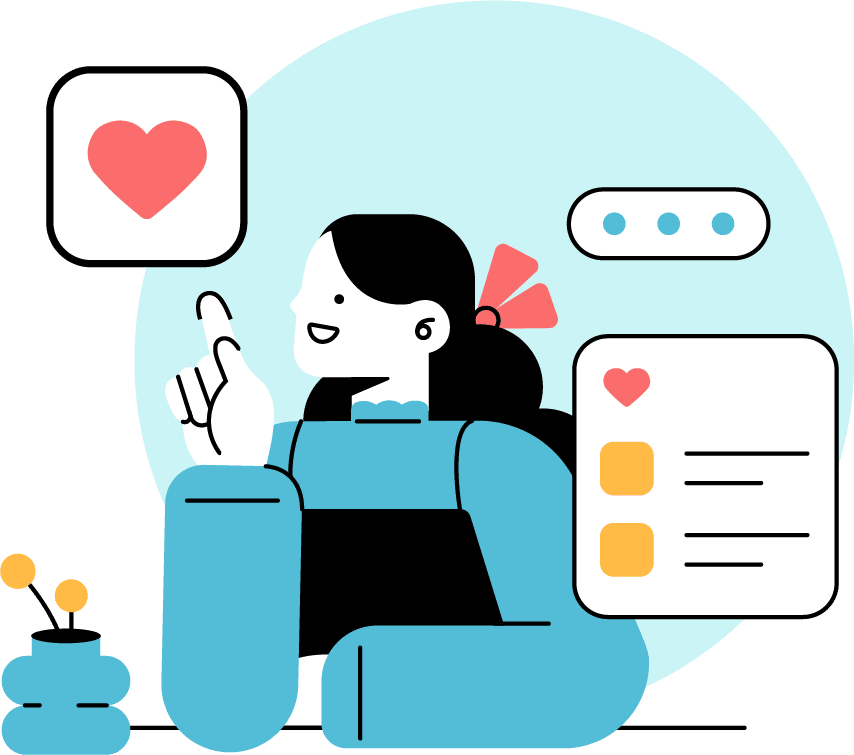As we age, it becomes more difficult to get out and about, making it harder to socialize and stay active. This can lead to feelings of loneliness and isolation, which can impact our mental health. Virtual therapy provides a solution by bringing the therapist into our homes via video call, making it more convenient and accessible for seniors.
If you or a loved one is in need of connection or mental health support, virtual therapy could be a great option. In this article, we’ll explore the benefits of online therapy and virtual therapy for seniors.
What is Online Therapy?
Virtual therapy, online therapy, or teletherapy, is therapy that’s delivered via video call or through online therapy sites. This can be done using a computer, laptop, smartphone, or tablet with an internet connection. Common platforms for virtual therapy include Zoom, Skype, and RingCentral. It’s a convenient, safe, and secure option for people who might not be able to physically go to a therapist’s office, such as those with mobility issues or those who live in rural areas.
For example, older adults might have trouble getting to their therapist’s office due to transportation issues or tall flights of stairs. Or, they may not want to leave their home because they don’t feel safe going out. Sometimes, a person’s mental health can be in such poor shape that they aren’t able to bring themselves to in-person therapy. In these cases, online therapy can be a great option.
How does virtual therapy work?
There are several different ways that virtual therapy can be conducted. The most common is via video call. This allows the therapist and patient to see and hear each other in real time.
Other methods of online therapy services include text-based chat, email, or even phone calls. While not as common, these methods can still be effective. It’s important to find a therapist that you feel comfortable with and who uses a delivery method that you’re comfortable with.
Of the two options, many seniors are the most comfortable with video or audio calls. This is because it’s the closest to an in-person interaction.
The Top 5 Benefits of Virtual Therapy for Older Adults
When it comes to mental health, seniors have a lot of needs. They may be dealing with age-related issues, such as retirement, chronic health problems, or the death of a loved one. These life changes can be stressful and overwhelming, which is why mental health support is so important for seniors.
Virtual therapy provides many benefits for seniors, including:
The Convenience of Virtual Therapy
As we age, it becomes more difficult to get out and about. Arthritis, chronic pain, and other health problems are all natural parts of getting older, but they can make it hard to keep up with regular appointments, such as therapy sessions. Virtual therapy eliminates this problem by bringing the therapist into your home via video call. This means that you don’t have to worry about traveling to and from appointments.
The Comfort of Virtual Therapy
Another great benefit of virtual therapy is that it can be done from the comfort of your own home. This is particularly beneficial for those with mobility issues. It’s also a great option for seniors who may feel unsafe leaving their homes due to COVID-19. In addition to physical comfort, some seniors may feel more comfortable talking about certain topics in the privacy of their own homes.
Connection and Online Community
Some online therapy takes place as group therapy, like a virtual IOP for instance. This can be a great way to stay connected with other aging adults who may be dealing with similar mental health issues. As we get older, it can become difficult to maintain a social life. The sense of connection that comes from an online group therapy session can be very beneficial for our mental health.
Reduced Cost of Virtual Therapy
Virtual therapy can often be more affordable than in-person therapy. This is because you don’t have to pay for transportation to and from appointments and the therapist can also work out of their own home. Most insurance companies offer telehealth therapy coverage and insurance company data shows that virtual therapy outcomes are just as beneficial as traditional therapy.
Increased Access to Virtual Therapy
Online therapy provides increased access to mental health care, especially for those in rural areas. This is because you don’t have to physically go to a therapist’s office.
Some Common Apprehensions About Virtual Therapy
When it comes to mental health, there can be a lot of stigma and taboo surrounding the topic. This is especially true for older adults. They may feel like they’re not supposed to be dealing with depression, anxiety, or other mental health issues because they’re retired or because they’re “too old.” They may even feel that the younger generations are too sensitive and that mental health care is for crazy people.
This isn’t the case! Mental health care is important for people of all ages. If you’re an older adult and you’re dealing with mental health issues, don’t be afraid to seek the help of a mental health professional.
Here are some common apprehensions that aging adults and seniors may have about seeking mental health and behavioral health care:
“I’m too old for this.”
This is one of the most common misconceptions about mental health. Just because you’re a senior doesn’t mean that you don’t deserve to feel safe and secure from anxiety disorders and major depression. In fact, mental health services are just as important for older adults as it is for people of any other age group.
“It’s too expensive.”
Another common misconception is that mental health care is too expensive. While therapy can be costly, there are many ways to get quality care without spending a lot of money. For example, many therapists offer sliding scale fees or insurance reimbursement. You can also look into free or low-cost options, such as community mental health centers. Check your insurance eligibility as well, as most licensed providers accept insurance.
“I’m not sure if it will help.”
It’s normal to feel skeptical about whether or not talk therapy will actually help. However, it’s important to keep in mind that therapy is a process, and it takes time to see results. If you’re patient and you give therapy a chance, it can be very beneficial for your mental health and overall well-being.
“I don’t want to talk about my personal business.”
This is another common apprehension that people have about therapy. It’s normal to feel like you want to keep your personal life private. This is especially true when it comes to mental disorders and traumas. However, part of the therapeutic process is sharing your thoughts and feelings with a therapist during talk therapy sessions. This can be very beneficial in working through your issues and feeling better.
“I don’t understand the technology.”
Online counseling may seem daunting if you’re not familiar with the technology. However, most virtual therapy platforms are very user-friendly and easy to use. If you’re not sure how to use the platform, your therapist or licensed clinical social worker can walk you through it before your first session. You can also ask a family member or another adult that is willing to help.
“How do I know no one else is listening?”
When you’re using an online therapy platform, your sessions are private and secure. This means that only you and your therapist will be able to see and hear each other. You don’t have to worry about anyone else listening in on your sessions.
“I’m not comfortable talking about personal things on a computer.”
If you’re not comfortable talking about personal things on a computer, that’s okay. You can always opt for phone therapy or in-person therapy. However, many people find that virtual therapy is just as effective as other types of therapy, and although it may feel unnatural at first, it should get easier as time goes on.
“I’m not sure if my insurance will cover it.”
Online therapy is typically covered by insurance, just like in-person therapy. However, it’s always a good idea to check with your insurance provider to be sure.
How to Help Someone Through their Apprehensions
If you or your loved one needs mental health care but is reluctant, here are some ways you can help them through their apprehensions:
1. Talk about the benefits of mental health therapy.
If your loved one is hesitant about seeking therapy, talk to them about the benefits. Explain how therapy can help older adults deal with their mental health issues with a mental health professional. If they’re worried about the cost, let them know that there are many ways to get quality care without spending a lot of money.
2. Help them find a therapist.
If your loved one is ready to seek therapy, help them find a therapist. You can look for therapists in your area, or you can search for therapists who specialize in treating seniors. Once you find a few therapists, help your loved one choose the one that’s right for them.
3. Be there for them.
It’s important to be there for your loved one during their journey of seeking therapy. This means being supportive and understanding. Let them know that you’re there for them and that you’re willing to help in any way you can. If they opt to do online therapy, be sure to help walk them through the technological process so they can access their therapy sessions when they’re on their own.
4. Encourage them to stick with it.
If your loved one is seeing a therapist, encourage them to stick with it. Therapy is a process, and it takes time to see results. If they’re feeling discouraged, remind them of how far they’ve come and encourage them to keep going.
Final Thoughts
Virtual therapy could be a great option for seniors. It’s convenient, comfortable, and can be done from the comfort of your own home.
If you’re a senior citizen who is considering therapy, don’t let your apprehensions hold you back. There are many benefits to virtual therapy, and it can be a very effective way to deal with mental health issues. If you’re not sure how to get started, you can start by talking to your primary care doctor or by searching for a therapist in your area.
Clear Behavioral Health’s Virtual Programs can bring you the peace of mind that you or a loved one has been searching for.





